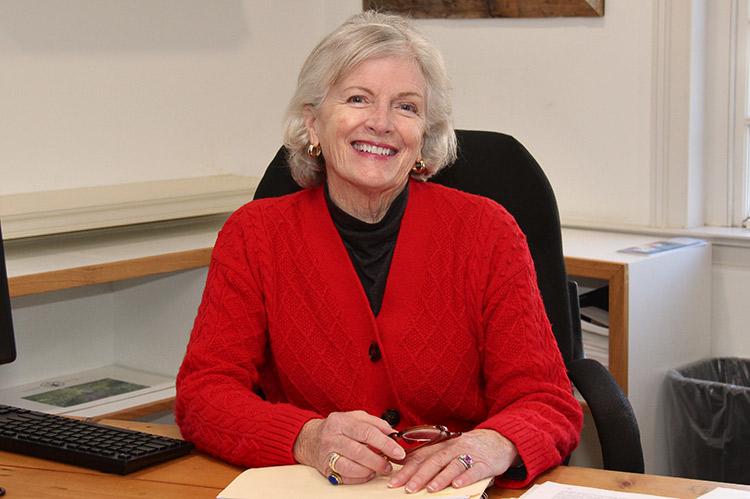Forty years after moving to East Hampton Town and more than 20 years after starting a journey in public service that has now reached its conclusion, Councilwoman Sylvia Overby reflected this month on her tenure on the town board, the planning board, and, prior to those, the Amagansett Citizens Advisory Committee.
Ms. Overby, like Supervisor Peter Van Scoyoc, announced early this year that she would not seek re-election. An “out of the blue” illness kept her physically removed from the town board for four months this year, but she returned in September and has responded “exquisitely” to therapy, she said.
“First, let me say, this is probably the most enjoyable job I’ve had, even though it’s had its ups and downs, and certainly its challenges,” Ms. Overby, a Democrat, told The Star. She was elected to the board in 2011, for what would be the first of three terms, during the tenure of Supervisor Bill Wilkinson, a Republican who had won election in 2009 after his Democratic predecessor had misspent community preservation fund money and driven the town deep into debt. “When I came into office, it was during a pretty tumultuous time. There was a lot of disrespect going on for the public and for the other town board members.”
She and Mr. Van Scoyoc, another Democrat elected to the board in 2011, “went through some interesting times,” she said, recalling a town board marked by friction and negativity. “It was personal,” she said. “Peter and I kid — partly — about the P.T.S.D. that we’re still suffering from. The nicest thing that they said to us was that we were bookends and we were thinking alike, because we sat at the farthest ends” on the dais. “The rest of the things I wouldn’t repeat, because they were not how to get along with your colleagues. It prepared me, in a different way, for, almost, combat. It felt like I was under siege.”
A notable exception, she said, was the Republican Councilman Fred Overton, who “was always a gentleman, a lovely man to work with. We didn’t always see eye to eye, but he always was cordial and listened. I think that’s the most important thing in this position, to listen to your constituents, to your colleagues. I hope that’s what I did.”
A California native, Ms. Overby’s family moved to Florida, where she graduated from high school before going on to Emory University in Atlanta. It was there that she met her husband, a native of Huntington who had visited Montauk with his family since childhood. “Those were his best times, his fondest memories,” she said.
In Atlanta, she taught biology, and the couple owned a business. They visited the South Fork, and “I had that moment. I know other people have had that moment when they arrive and say ‘Okay, I’m convinced. You don’t have to show me anything else.’ This,” she said, “is a place worth fighting for.”
They sold the business and moved north. “We decided that this was where we wanted to raise our kids,” she said. “They made their best friends here. Their best friends for life were from this area.”
She joined the Amagansett C.A.C., and was later elected its chairwoman. “Then you get involved in political issues, and you’re up in front of the town board,” she said. She was appointed to the planning board in 2004, gaining valuable experience in “how to formulate and understand both sides of an issue, because you not only represent the town, but you’re representing the applicant at the same time. A lot of time it was compromise, and you learn that. It’s not ‘they’re the bad guy, we’re the good guys.’ It shouldn’t be that, anyway. We had to look at how we can work together. And that goes with being in this position — you have to work with everyone, you have to work with your constituents. I learned to try to be in their shoes, and I learned more empathy.”
She recalled her work to return Indian Wells Beach in Amagansett to residents, after it had developed a reputation for alcohol-fueled revelry, taxis and buses swarming its parking lot, and heaps of garbage and overflowing bins. “It had really gotten out of hand,” she said. “This led to our alcohol ban within a certain distance from lifeguard stands. Getting our hands around that and making it a local beach again was really important.”
“The next thing that I worked on was formula store legislation,” she said, the catalyst being the arrival of a 7-Eleven in Montauk. “Now, stores, if they’re changing to a formula store, have to go to the Planning Department and they have to be something else, they can’t be a 7-Eleven, they have to be ‘Montauk Market’ or something like that. We’re trying to keep the community character, and certainly we can see how [East Hampton] Village has changed. Again, it’s more about locals and making sure that local businesses survive.”
She pointed to affordable housing as a third accomplishment, including completion of the Manor House condominiums in East Hampton. “I had seen it when I was on the planning board, and it had just stopped,” she said. “Bringing that back and getting it to the finish line wasn’t easy.” She also cited preservation of open space, including the plan to transform the Springs property that belonged to the Abstract Expressionist artists James Brooks and Charlotte Park into an art and nature center, as an accomplishment.
“I’m just so grateful that I was able to be in this position for the 12 years I was here,” she said. “I hope I made a difference, and I think that the proof will be in the pudding, as they say, down the line. I just am grateful for everything that I was doing here, and my colleagues. The employees are fantastic. We’ve just been very lucky, I think, all the way around.”




